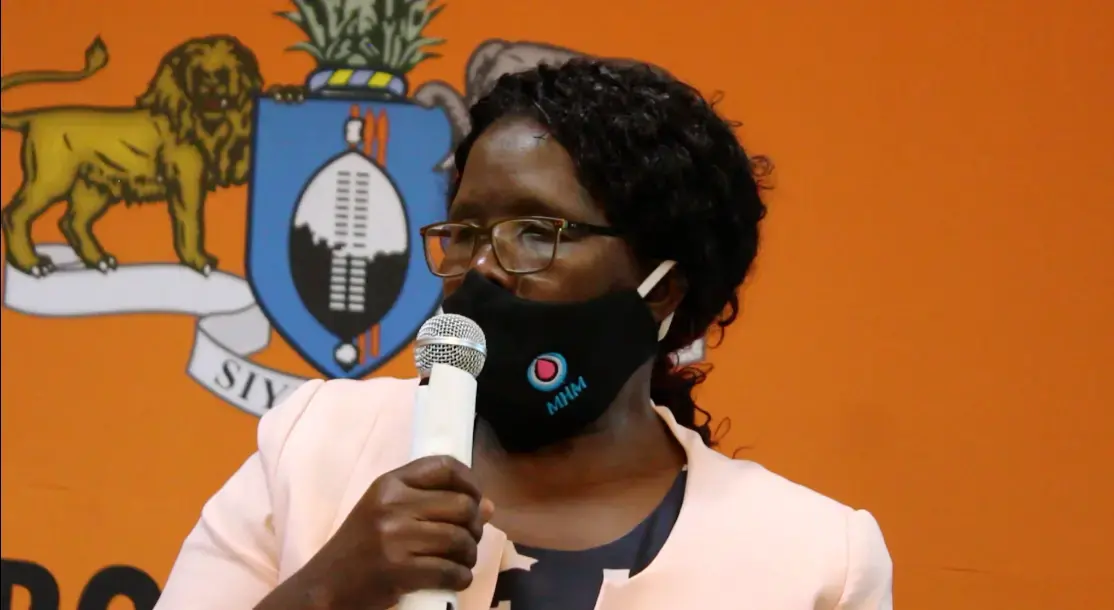Women participants in a joyful mood singing at the commemoration ©UNFPA 2018
“Li!Li!Li!Li!Li!”, ululated throngs of Lutsango women’s regiment who attended this year’s commemoration of International Women’s Day at the Royal Swazi Sun. This year’s local theme was ‘Leave No Woman Behind in Political and Decision Making Positions’ based on the global theme ‘Time is Now: Rural and Urban Activists Transforming Women’s Lives’. The commemoration was attended by the Deputy Prime Minister, Senator Paul Dlamini, Minister of Justice and Constitutional Affairs Senator Edgar Hillary, members of the Royal Family, the UN family, traditional leadership, the private sector, NGOs, Lutsango, the media.
Discussion panel members from left Elections and Boundaries Commission representative Mr. Mbonisi Bhembe, Traditional leadership representative Chief Mawandla Gamedze, Swaziland National Youth Council (SNYC) Representative Ms. Colisile Masilela, Coordinating Assembly of Non- Governmental organisations (CANGO) representative Ms. Lungile Mnisi, Lutsango Women’s regiment representative Princess Phumelele and Ministry of Justice and Constitutional Affairs representative Mr. Vikinduku Manana ©UNFPA 2018
The commemoration was started with a panel discussion comprised of speakers from the Elections and Boundaries Commission (EBC), Ministry of Justice and Constitutional Affairs, CANGO, Swaziland National Youth Council, traditional leadership and Lutsango. In his welcome remarks, the Hhohho Regional Administrator, Prince Tshekedi said “women are a valuable engine in the development of the nation. We cannot leave women behind in any endeavor. The establishment of a dual leadership in the Queen mother and His Majesty the King is a good example that should be a lesson to us all”
The theme for International Women’s Day this year focused on leaving no woman behind in political and decision making positions as the country moves towards national elections. Leadership continues to be dominated by men in both public and private spheres in Swaziland. Whilst women make up fifty-one percent (51%) of the total Swaziland Population according to the 2017 Swaziland Population and Housing Census, only twenty-two percent (22) sit in the 10th Parliament to support legislative matters on their welfare. When women are such a minority, they can be easily voted out and their voices may never be heard. This implies that they cannot decide on issues that affect their well-being and this has negative repercussions on their advancement as women and on their journey to vision 2022 and to agenda 2030 on the SDGs. In short, their right to development is severely compromised. Similarly, only twenty-nine percent (29%) of cabinet ministers are women. With such little representation in Government’s highest decision making body, policies and other issues pertaining to women may not be given the due attention and urgency.
The EBC representative encouraged women to stand for the national elections. He shared how most women are nominated but are unable to reach the end of the elections. Representing the youth, the speaker from SNYC shared that they will advocate for young people to stand for election instead of being used by adults who end up winning elections at the expense of the young people.
“Chiefs are father figures of communities they lead, they are the footstools of His Majesty the king where they are called by the King to promote equality in their communities. We need a change of mindsets, we need to believe and embrace women’s leadership in our communities. As Chiefs, we need to be seen to be appointing women to position’s of leadership” said Chief Mawandla who represented traditional leadership at the commemoration.
Speaking for the Lutsango, women’s regiment, Princess Phumelele who is a member of the women’s regiment Lutsango and a Senator in Parliament said “Women have been taught that they are safe if they have a man which has instilled the thinking that they are less than men. We need to start our children young because culture has taught us that we are inferior as women…women need to stand for elections and not doubt themselves. The assumption that once women are in power they become snobbish is a common notion. The mentality that only men can lead is widespread in Africa which I have observed in a number of countries where I have attended as an observer. I wish Swaziland would adopt the zebra system that Rwanda uses which has enabled them to reach 50% quota for women representation in parliament. We have a task as women to teach our girls that they too can be leaders.”
Honourable Deputy Prime Minister Senator Paul Dlamini delivering his remarks during the commemoration ©UNFPA 2018




